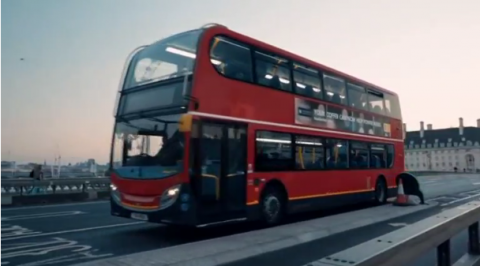
LONDON, United Kingdom (Reuters) — Waste coffee grounds will be used to help fuel some of London’s buses, Royal Dutch Shell and green energy company bio-bean said on Monday (November 20).
A new biofuel, which contains part coffee oil, is being added to the London bus fuel supply chain where it can be used without the need for modification, according to bio-bean founder Arthur Kay.
“Bio-bean has created a B20 fuel which is 20 percent bio-diesel as part of a broader mineral diesel mix. The real driver for this is to make a fuel that’s useable within existing engines,” Kay told Reuters TV.
“What we’re trying to do is deliver fuels that can work at scale today.”
Bio-bean and partner Argent Energy have so far produced enough coffee oil to power one bus for a year, if used as a pure-blend for the 20 percent bio component and mixed with mineral diesel to form a B20 fuel, they said.
“Going forward we’re looking to find ways to try and increase that blend from a B20 to a B30 and eventually one day to a B100 fuel,” said Kay.
Bio-bean said the average Londoner drinks 2.3 cups of coffee a day, producing over 200,000 tons of waste a year. It collects waste grounds from high street chains and factories, which are dried and processed to extract coffee oil.
Nevertheless, Kay said coffee alone couldn’t provide all the biofuel for London’s buses as there simply isn’t enough raw material.
“Even if we got all the waste coffee ground in London it would be enough to power roughly one-third of London’s bus network using a B20 blend. So, a significant contribution, but it’s not going to solve everything in one go,” he said.
Transport for London has been turning to biofuels to curb carbon emissions, trialing a fuel made with used cooking oil from the catering industry, the transport operator said on its website.
The coffee fuel technology has been supported by Shell.
“The future of energy is going to be a mix. That mix will come from solutions that Shell will provide and some others; other start-ups and people will come across. Our intention is to keep on supporting those ideas and make them grow and hopefully see them thrive,” said Shell spokesperson Malena Cutuli.
Globally, millions of tons of waste coffee grounds are sent to landfill where they emit methane – a potent greenhouse gas – as they decompose. Kay added that he would like to see the bio-bean model scaled up internationally.
“There’s nothing to say that the same technology can’t be used in cities all around the world. Coffee’s one of the world’s most popular drinks and millions of tons of waste coffee grounds are produced and wasted every year. And so we want to work with companies to save them money and importantly save CO2 emissions,” said Kay.







